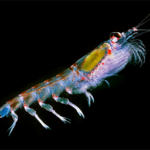Global Maritime Accord Academy

The Global Maritime Accord (GMA) is the first integrated and coordinated approach towards the harmonized administration and governance of the oceans, especially the Areas Beyond National Boundaries, or High Seas. It aims to organize, systematize, and enforce the implementation of the UN Sustainable Development Goals as a public good for the sustainable future of all. focused on the oceans in a shared civic and naval effort.
GMA and its Academy (GMAA) are focused on the health of oceans in a globally shared effort. They aim to strengthen and support the implementation of the Intergovernmental Conference on legally binding instruments under the United Nations Convention on the Law of the Sea on the safeguarding of marine biological diversity in areas beyond national jurisdiction.
Members of the Accord development effort include oceanographers, lawyers, environmentalists, diplomats and naval security experts, from Australia, Canada, Chile, Denmark, Germany, India, the Netherlands, New Zealand, Kenya, Sri Lanka, the United Kingdom and the United States.
The GMAA is an initiative led by the Liechtenstein Institute for Strategic Development GmbH for the Society of Aerospace, Maritime and Defence Studies (SAMDeS), with Sai University, global ALLIES, The Trebuchet - Breaking Down Barriers - Building Bridges, Tufts University, and the International Military Council on Climate and Security.
Webinars for Ocean and Climate Policy Innovators, Researchers and Media
For information and registration write to GMA@eurisd.org
8 June 2024 -
Webinar Topic 5:
Save the Oceans for a Safe Earth - World Ocean Day
Invitation PDF
24 Jan 2024 -
Webinar Topic 4:
Climate Engineering and the Ocean
Invitation PDF
26 Oct 2023 -
Webinar Topic 3:
Deep-Ocean Stewardship: Avoiding the Dangers of Seabed Mining
Invitation PDF
28 July 2023 -
Webinar Topic 2:
UNCLOS or SOS? Can the law save our seas?
Invitation PDF
25 April 2023 -
Webinar Topic 1:
Ending the menace of IUU fishing and overfishing
Invitation PDF
GMA Chairs

GMA Chair & Head - Admiral RK Dhowan (Retd), formerly the 22nd Chief of Naval Staff of the Indian Navy, had a distinguished career of 42 years. Since he served as 5th Chairman of the National Maritime Foundation, India’s premier maritime think tank. The Foundation benefitted from his vast experience in the Navy, and formulation of wide range of maritime publications including; Indian Navy in the 21st Century: Maritime Security for National Prosperity (2014); Ensuring Secure Seas: Indian Maritime Security Strategy (2015); Indias Maritime Heritage (2016), United Through Oceans: International Fleet Review 2016. In 2020 the Admiral launched a multidisciplinary think-tank The Society for Aerospace, Maritime and Defence Studies (SAMDeS) as the Founding Chairman. Here the Admiral 's mission is to draft the Global Maritime Accord with the vision to Save Oceans for a Safe World.

GMA Chair & Head - Prof. Peter Droege directs LISD, the Liechtenstein Institute for Strategic
Development, and is a leading international sustainability expert on development policy, management, transport strategy, city design, regional planning and renewable infrastructure development. His academic career stretches from the School of Architecture and Planning at the Massachusetts Institute of Technology and his position at the University of Tokyo as Urban Development Engineering Endowed Chair to his position as Lend Lease Chair and Professor of Urban Design at the University of Sydney, and Conjoint Professorship at the University of Newcastle’s School of Architecture and Built Environment. He is an emeritus Professor at the University of Liechtenstein focused on sustainable spatial development.
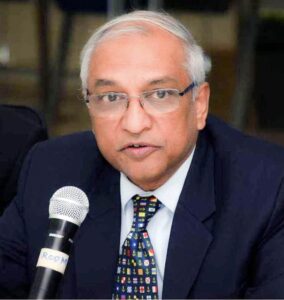
GMA Chair - Commodore Sujeet Samaddar is the Co-founder of the Society for Aerospace, Maritime and Defence Studies SAMDeS: Adviser MRAI: Member, FICCI Aero & Def Committee: Distinguished Fellow, CAPS: Member, Governing Council, SIOS: Member Ae.S.I: Former VP-TATA NOVA, CEO ShinMaywa India, Admira Distributed Hybrid Energy Systems. Besides setting up a major industrial complex in India through focused JVs, strategic partnering with Indian and foreign companies and experts operating in the specific areas of aerospace, defence and material recycling industries, his professional interest is to bring in smart technologies to India for sustainable development particularly on recycling and promoting the circular economy. Specialties: Mechanical Engineering. Defense Acquisition and Offsets. Material Recycling, Circular Economy and the Blue Economy for sustainable development and inclusive growth.
Faculty
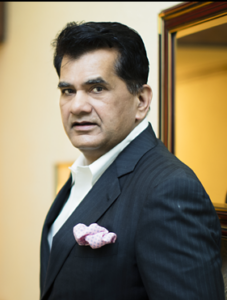
Amitabh Kant is a governance reformer and a public policy change agent for India, having driven key reforms and initiatives during his tenure as the CEO, NITI Aayog and Secretary of the Department for Industrial Policy and Promotion (DIPP), Government of India. Amitabh Kant has a BA Eco (Hons) from St. Stephens, Delhi University and M.A Eco from Jawaharlal Nehru University. He is a Chevening Scholar. He also attended John F. Kennedy School of Governance, Harvard University and Indian Institute of Management (IIM), Ahmedabad for short term mid-career studies. He is the author of several books and has published over 500 articles. Mr Kant has won several global recognitions including Sir Edmund Hillary Fellowship awarded by the Prime Minister of New Zealand and Order of the Rising Sun, Gold and Silver Star, by the Government of Japan to name a few. Amitabh Kant is presently India’s G20 Sherpa.
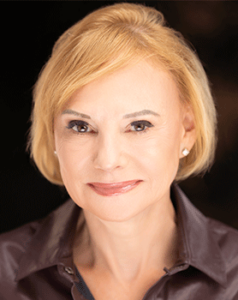
Sherri Goodman, Senior Fellow at the Wilson Center’s Environmental Change and Security Program and Polar Institute, and Secretary General of the International Military Council on Climate & Security, is credited with educating a generation of US military and government officials about the nexus between climate change and national security, using her famous coinage, “threat multiplier,” to fundamentally reshape the national discourse on the topic. Sherri serves as Vice Chair of the Secretary of State's International Security Advisory Board and on the EXIM Bank's Council on Climate. A former first Deputy Undersecretary of Defense (Environmental Security) and staff member on the Senate Armed Services Committee, Goodman has founded, led, or advised nearly a dozen research organizations on environmental and energy matters, national security, and public policy.
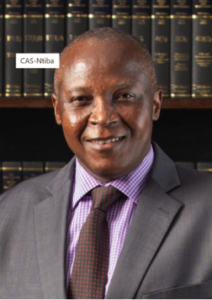
Prof. Micheni Japhet Ntiba is a Full Professor of Zoology specializing in Fisheries and Marine Biology at the University of Nairobi where he started working in 1989 to date. He was Chairman of the Department of Zoology and Director of the School of Biological Sciences at the University of Nairobi. He has held significant positions in Government including First Executive Secretary of the Lake Victoria Fisheries Organization (LVFO) of the East African Community EAC) from 1997-2002 in Jinja Uganda. In the Public Service of Kenya he was Principal Secretary for the State Department of Fisheries and the Blue Economy from 2008 to 2020, Principal Secretary for University Education and Research in 2018, and Chief Administrative Secretary for the State Law Office from 2021 to 2022.

Lt Cdr Rolerick Sobers is a Reserve Coast Guard Officer in the Barbados Defence Force and a former Senior Officer in the Department of Fisheries, Barbados Public Service. His qualifications include a Master’s Degree in Marine Surveying and post graduate certification in Fisheries Policy and Planning. He has also completed several professional courses in Caribbean and Maritime Security Strategies, Managing Defence in the Wider Security Context, and Countering Transnational Organized Crime. He joined the staff of the Regional Security System in the post of Regional Maritime Officer in 2017. In his current assignment, he has responsibilities for the coordination of maritime matters relating to the RSS and those areas of synchronization and joint operational activities with national, regional and extra-regional partners of the RSS.

Prof. Christian Bueger is Professor of International Relations at the Department of Political Science, University of Copenhagen where he leads the Ocean Infrastructures Research Group and the Copenhagen Ocean Hub. Earlier, he was professor of international relations at Cardiff University and has held visiting positions at the University of Seychelles, one of the directors of the SafeSeas network on maritime security, and a research fellow at the UN Institute for Disarmament Research (UNIDIR) at several Universities. He was a Leverhulme Fellow at the Greenwich Maritime Institute, London (2011) and a research fellow at the Institute for Development and Peace, Duisburg, Germany (2010). Professor Bueger has written extensively on global governance, international theory, and global ocean politics. He obtained his PhD in Political and Social Sciences from the European University Institute, Florence, Italy (2010).

Prof. Lisa Levin is a Distinguished Professor Emerita at the Scripps Institution of Oceanography, University of California, San Diego, and served as the Director for the Center for Marine Biodiversity and Conservation from 2011-2017. Levin’s research interests include biodiversity of deep-sea continental margin ecosystems and the effects of climate change and direct human disturbance in the deep sea. Levin’s deep-sea research has been conducted on the margins of the Pacific, Indian and Atlantic Oceans using ships, submersibles and remotely operated vehicles to conduct experiments. She has participated in over 50 oceanographic expeditions around the world and served as Chief Scientist on many of these. Dr. Levin is co-founder and co-lead of the Deep-Ocean Stewardship Initiative, which seeks to integrate science, technology, policy, law and economics to advise on ecosystem-based management of resource use in the deep ocean and strategies to maintain the integrity of deep-ocean ecosystems within and beyond national jurisdictions.

Prof. Patrick LO Lumumba is an Advocate of the High Courts of Kenya and Tanzania and Law Lecturer at the Faculty of Law, University of Nairobi and the Director of The Kenya School of Laws since the year 2014. He is one of the Trustees and the Executive Director of the African Institute of Leaders and Leadership, Nairobi, Kenya. He received his LL.b and LL.M degrees in Law at the University of Nairobi, followed by a PhD in the Laws of the Sea at the University of Ghent in Belgium. He is an outspoken advcocate for intensifying and reinforcing the 2021 UNCLOS principles on averting the dangers of sea bed mining.
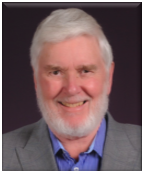
Tim Daniel specialised in public international law. His career included many matters involving the Law of the Sea. In particular, he represented the Federal Ministry of Justice of Nigeria for some forty years, leading the team against Cameroon in the land and maritime dispute which came before the International Court of Justice in 2002, and negotiating maritime boundary treaties in the Gulf of Guinea with Equatorial Guinea, Sao Tome & Principe, and Benin on behalf of Nigeria. He has also advised on deep sea mining issues in the Clarion-Clipperton Zone off Hawaii.
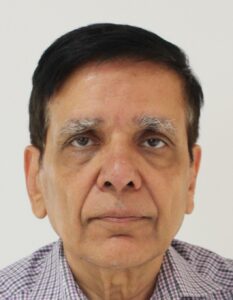
Raghbendra Jha PhD (Columbia), FWIF, is Emeritus Professor of Economics at Australian National University (ANU). Between 2001 and 2021 he was Professor and Executive Director of Australia South Asia Research Centre at the ANU. He has also taught at Columbia University and Williams College in the US, Queen’s University in Canada, University of Warwick in the UK and Delhi School of Economics, Indian Institute of Management Bengaluru, and Indira Gandhi Institute of Development Research in India. He has published 34 books/monographs with leading publishers including Oxford University Press, Routledge, Palgrave, Edward Elgar, World Scientific and ANU Press and more than 150 papers in leading scientific journals and other refereed outlets. His work is in the areas of public economics including environmental economics, macroeconomics, development economics and the Indian economy.
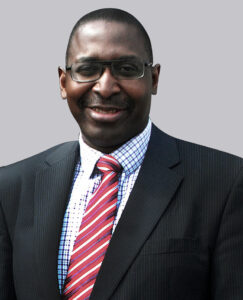
Edwin Egede, is a Professor of International Law and International Relations at Cardiff University's School of Law and Politics. He also serves as an Adjunct Professor at Nelson Mandela University's Department of Public Law in South Africa. Furthermore, he is a Fellow of the Learned Society of Wales (FLSW), Wales' National Academy for Arts and Sciences. He has also acted as a consultant for international organisations such as the United Nations, the International Seabed Authority, and the African Union. Moreover, he is currently a member of the Legal and Technical Commission of the International Seabed Authority. Additionally, he is a member of the Advisory Board of the Brazilian Yearbook of Law of the Sea and one of the editors of a six-volume book project on The Law of the Sea - Contemporary Norms and Practice in Africa (BYLOS).

Dr. Dyhia Belhabib is an expert on illegal fisheries, maritime crime, and just conservation and enforcement. As Principal Investigator at Ecotrust Canada she founded Spyglass, the world’s most comprehensive criminal record of fishing vessels. As Executive Director at Nautical Crime Investigation Services works on responsible technologies for maritime enforcement and fisheries management. A leading expert on West African fisheries, marine ecosystems and the challenges facing small-scale fishers, she collaborated with local communities on responsible fishing practices and build capacity in marine conservation enforcement. Her knowledge helped her to identify the challenges of access to credit, infrastructure, and market opportunities. Dr. Belhabib authored over 110 peer reviewed articles, book chapters, and reports.
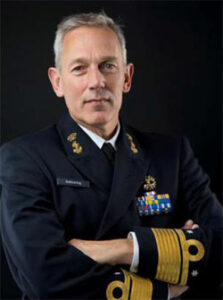
Vice Admiral Ben Bekkering (Retd), International Military Council on Climate and Security (IMCCS), served 40 years with the Royal Netherlands Navy until 2019. He spent most of his junior years on board frigates, in various roles. During the second part of his career, he rotated between command positions at sea and staff positions ashore. He commanded a frigate, an amphibious ship and one of NATO’s permanent Task Groups: 'Around Somalia he rallied local community support in discouraging piracy'. His staff positions were mainly in the field of plans and policy, both in the naval and the defense staff. In 2015 he became Deputy Commander of the Navy. He concluded his military career in Brussels, serving as the Netherlands’ Permanent Military Representative to NATO and the EU from 2016 to 2019.



